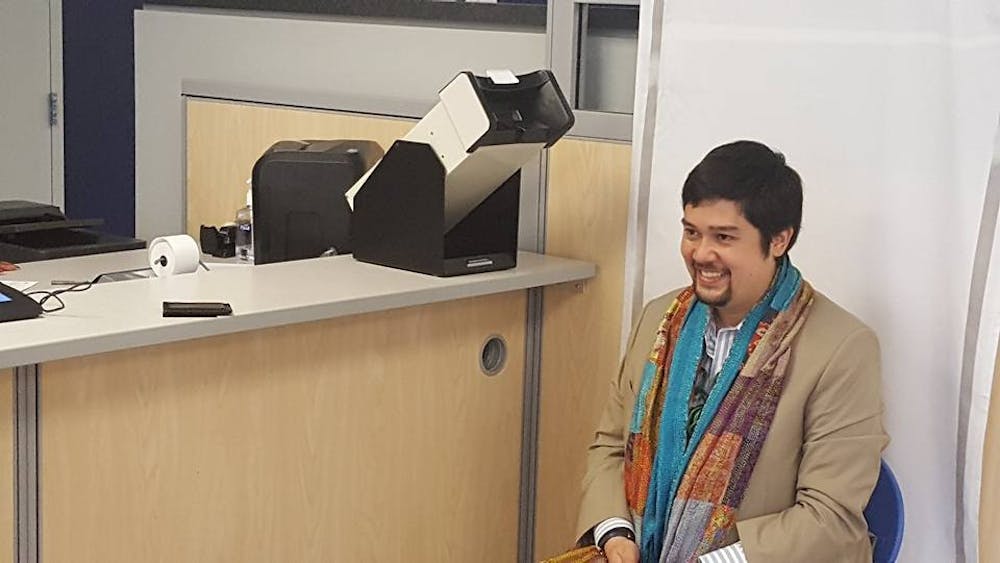AU alum and adjunct professor Nic Sakurai became the first person in the U.S.to receive a gender-neutral driver’s license on June 27 when the District of Columbia became the first jurisdiction to allow residents to mark their gender as “X” on their licenses.
Sakurai, who also serves as associate director of the University of Maryland’s LGBT Equity Center, said they felt excited and relieved when they heard about the new option.
“I feel like every day of my life I’ve had an I.D. that isn’t accurate to who I am,” Sakurai said. “To finally have that corrected and at least not feel excluded based upon that is quite an exciting thing and relief to finally have.”
Today #DCDMV issued driver licenses and ID w/gender neutral identifier 'X.' 1st jurisdiction in the nation to do so. pic.twitter.com/br6HNFjQLI
— DC DMV (@dcdmv) June 27, 2017
Sakurai, who uses “they” and “theirs” pronouns, began pursuing the non-binary option for their license in February and met with the Department of Motor Vehicles in March. They were pleasantly surprised to find that the DMV had already published more information about the option in a public document, with the policy already in the planning stages.
Sakurai noted that D.C. is known for having some of “the best trans-inclusive, gender identity and expression rights policies in the country and the world.”
“I don’t think that at the end of the day, that my driver’s license or anyone’s needs to have a gender or sex listed at all,” Sakurai said. “Having options that allow people to put something that is actually accurate is important.”
Sakurai said this legal change means that the government recognizes there are more than just two genders. Sakurai noted that D.C. residents, regardless ofhow they identify, can receive the “X” on their licenses if they decide not to specify their gender.
According to Sakurai, the mayor's office directed D.C. agencies to issue their own trans-inclusive policies based on the human rights code on Gender Identity and Expression in 2016, with the agencies adopting policies with the templates provided by D.C.’s Office of Human Rights.
With the gender neutral option now offered in the District, Sabrina Hernandez, a senior in the College of Arts and Sciences, hopes to see the option offered in other states.
“I think this is about acknowledging and valuing all identities and it should not be about which city was first, but rather about which cities and states are making positive strides to protect and validate nonbinary people,” Hernandez, who contributes to AU’s Center for Diversity and Inclusion, said.
Kameron Winters, coordinator for LGBTQ & Diversity Programs at the Center for Diversity and Inclusion, believes that this option will be a great change for students, faculty, staff and alumni who want to their licenses to better align with their gender identity.
“I think this is going to impact the whole community and make people feel more comfortable and make them feel themselves,” Winters said.
Mel Keller, a 2017 School of Public Affairs graduate and the former head of AU’s Queers and Allies, said they are proud of D.C. for taking this step.
“I think it's such an important piece of validation for a lot of nonbinary individuals in the district,” Keller said. “D.C.'s decision is proof that the support and access that nonbinary individuals are getting will continue to make a difference.”
Keller, who is also a former resident assistant on campus, said that the gender neutral option will have an impact on students living in campus housing.
“Knowing that D.C. has a gender neutral option will make students feel more comfortable in the dorms, and hopefully Housing and Dining Programs will continue to work on gender neutral housing options on campus to accommodate those students,” Keller said.
Transgender and nonbinary individuals often face many challenges, from being unable to request the correct identification to match their identity on legal documents, to brutal attacks all over the world. According to the Human Rights Campaign, at least 15 transgender individuals have been victims of fatal violence in 2017 in the United States, with a few of the cases caused by “clear anti-transgender bias.”
“The fact that it is now becoming a District conversation is great, but it also means that we need more protections and services for non-binary and other individuals who face violence and oppression because of who they are,” Hernandez said.
For students who are in states where the gender-neutral option is not available, Winters said they should be encouraged to “start that conversation.”
“If people are in a position to be outspoken and push this agenda forward, then do so,” Winters said. “But also, sometimes it may be unsafe to put yourself out there, so go with caution and make sure you are in a good place moving forward.”





